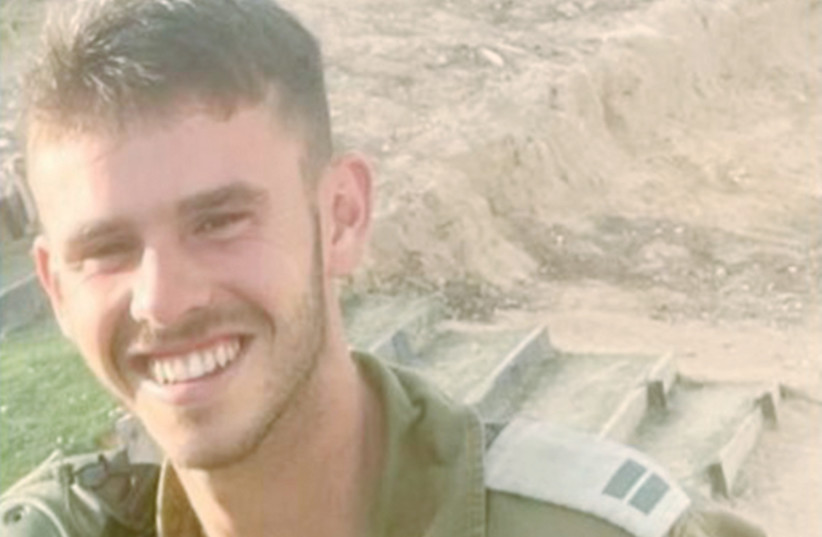Being an Israeli means making the ultimate sacrifice – opinion
My first recollection of Israel is as an eight-year-old when my parents brought me here on holiday shortly after the Six Day War. It was the beginning of a deep and meaningful relationship.
As a small child, I marveled at the fact that I could stand at the burial site of the Patriarchs and Matriarchs, who were such an integral part of my upbringing as a Jewish kid in the Diaspora.
I wanted to be a real Israeli.
My family purchased a holiday apartment in Netanya in the 1970s, and when I visited as a teenager, I felt a bit more Israeli because I wasn’t staying in a hotel!
After leaving high school, I spent six months on Kibbutz Be’erot Yitzhak, where I learned to speak Hebrew, pick oranges, harvest artichokes, and catch chickens in the middle of the night and take them to market.
I was pretending to be a real Israeli.
I wanted to stay, but my parents insisted that I return to take up my place in medical school. However, I brought a little bit of Israel home with me, and, again, I pretended to be a real Israeli by changing the pronunciation of my prayers to that of modern Hebrew instead of the old-fashioned Ashkenazi way I had been taught.

Being drawn back to Israel
I had intended to finish my studies and come straight back here – to be a real Israeli – but it didn’t quite work out that way. I qualified as a doctor, procured a decent job, found a wonderful wife, had kids, and the dream sort of faded but never died. I still wanted to be a real Israeli.
Eventually, I bought a property here and felt that bit more Israeli. Some of my children made aliyah and served in combat units in the army as lone soldiers. As I stood proudly at their swearing-in ceremonies, I was happy that they, at least, were real Israelis.
My own aliyah followed soon afterward, and I remember looking at my shiny new teudat zehut (Israeli identity card) and thinking, “Now I am a real Israeli!” But I was wrong.
Until now, I had not been through a war. Yes, my children had seen service, including Operation Protective Edge, but not like this.
Becoming a real Israeli
LAST SUNDAY, I attended the funeral of a 22-year-old hero soldier who lived 200 meters from my house on the next street. Capt. Harel Ittah, who served as a commander in the Givati Brigade’s reconnaissance unit.
I did not know him or his family, but in common with hundreds, perhaps thousands, of others, my wife and I draped our Israeli flags over our shoulders and stood on the street outside his house to pay our respects. All sections of society were there: old, young, religious, secular, and perhaps most poignantly, a group of bikers resplendent in their black leathers astride their Harley Davidsons with chrome gleaming in the sunshine, throttles roaring as if expressing the deep pain of us all.
I spotted a neighbor of the fallen soldier whom I knew from the synagogue and hitched a ride to the Military Cemetery for the burial. The car was silent apart from the plaintiff music of Ishay Ribo emanating from the sound system: “Ochila La’el” (I will put my hope in God). It seemed appropriate.
The cemetery was heaving with mourners, and I could only manage to stand at the entrance, shoulder to shoulder with people I had never seen before, all of us united in grief.
An ambulance arrived, and a stretcher was wheeled out, carrying a badly injured soldier called Yonatan (Harel had been his commander). His face was full of cuts and scars, his hands and legs heavily bandaged. He was wheeled directly in front of me.
And I wept.
The eulogies began, and one after the other, the grieving father, heartbroken mother, shattered brother, and grief-stricken girlfriend all said their goodbyes to this hero of Israel.
And I wept some more.
Then Yonatan was handed the microphone and he croaked his words of love and devotion to his fallen commander. Barely audible, he described how, had it not been for Harel, he would have been killed 10 times over. And we all wept, a deep cry from the depths of our souls.
Each one of the many speakers, including the chief rabbi of Netanya, family, friends, comrades, and army representatives, expressed the same ideas in their own inimitable ways.
What was clear was that this family, not a religiously observant one, displayed a faith so deep and true that I, an Orthodox Rabbi, could only dream of achieving. Their belief in the righteousness of this war; their faith in God’s ways, in Am Yisrael, the People of Israel, and in Eretz Yisrael, the Land of Israel; their acceptance of the ultimate sacrifice they and their son have been forced to make, together with their determination to “carry on” and complete the work that Harel had so heroically been a part of, was so powerful that I could only bow my head in awe and weep some more.
Then it dawned on me – to be part of something so special, so unique, so inexplicable – that faith and belief in our right to live in our ancient homeland in peace remain utterly steadfast even in the face of such personal tragedy – this is what it means to be a real Israeli.
As I struggled to see through the tears and my voice faltered as I tried to answer Amen to the final Kaddish, I uttered a silent prayer to the Almighty: “Please don’t make me a real Israeli; I am not up to it.”
The writer is a rabbi who lives in Ramat Poleg, Netanya, and is a co-founder of Techelet – Inspiring Judaism.





Comments are closed.